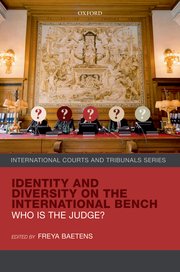This month’s Spotlight feature was contributed by Professor Freya Baetens (University of Oslo, Leiden University), editor of the newly published volume, Identity and Diversity on the International Bench: Who Is the Judge? (Oxford University Press).
International courts and tribunals hold the power to decide on questions involving sovereignty over territory, grave human rights violations, international crimes, or millions of euros’ worth of economic interests. Judges and arbitrators are the “faces” and arguably the drivers of international adjudication — yet certain groups tend to be overrepresented on international benches, while others remain underrepresented. Although international courts and tribunals differ in their institutional make-up and functions, they all rely in essence on the judgment of a group of individuals, each with their own background and experience. Even if adjudicators’ identity is not the only, and may not be the decisive, influence on their decision-making, the relative lack of diversity among them has an effect on the judicial process and its outcomes, which in turn entails broader implications for the legitimacy of international law. Against this backdrop, the book aims to analyse the implications of identity and diversity across numerous international adjudicatory bodies, focusing on a wide range of factors. Lack of diversity within the judiciary has been identified as a legitimacy concern in domestic settings, and the last few years have seen increasing attention to this question at the international level as well, making the book both timely and topical.
 This book examines, first, the (s)election of adjudicators, examining the paths taken by (potential) judges and arbitrators leading to nomination or (s)election, as well as the considerations of those — States, parties, appointing authorities — who have the power to decide whether to nominate or (s)elect a particular person. Second, the book analyses the experiences and impact of judges and arbitrators from underrepresented groups during their time spent on courts and tribunals, examining whether being a judge from such a group affects adjudicatory “style” or the behaviour of others on the bench, as well as counsel before it. Finally, this book scrutinises the legacy of adjudicators following their time on the bench, how their work on the bench is regarded by the parties and other actors outside the court or tribunal, and how this may influence developments at the domestic level.
This book examines, first, the (s)election of adjudicators, examining the paths taken by (potential) judges and arbitrators leading to nomination or (s)election, as well as the considerations of those — States, parties, appointing authorities — who have the power to decide whether to nominate or (s)elect a particular person. Second, the book analyses the experiences and impact of judges and arbitrators from underrepresented groups during their time spent on courts and tribunals, examining whether being a judge from such a group affects adjudicatory “style” or the behaviour of others on the bench, as well as counsel before it. Finally, this book scrutinises the legacy of adjudicators following their time on the bench, how their work on the bench is regarded by the parties and other actors outside the court or tribunal, and how this may influence developments at the domestic level.
Overall, this book focuses on a wide variety of identity features, including gender, nationality, ethnicity, religion, legal culture, education and professional background. Language as a mark of identity is also referenced in various chapters. Contributors include scholars in a variety of disciplines (law, political science, philosophy and linguistics) as well as practitioners: international judges, arbitrators and (former) State officials tasked with nominating and appointing adjudicators.
